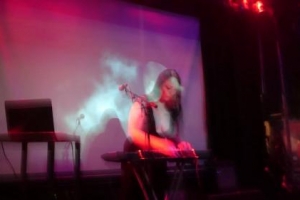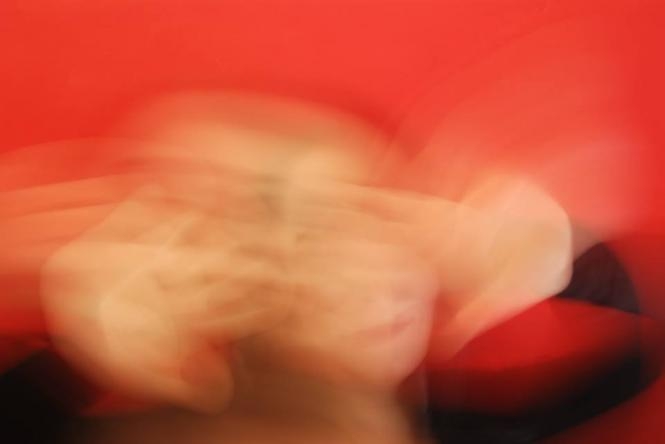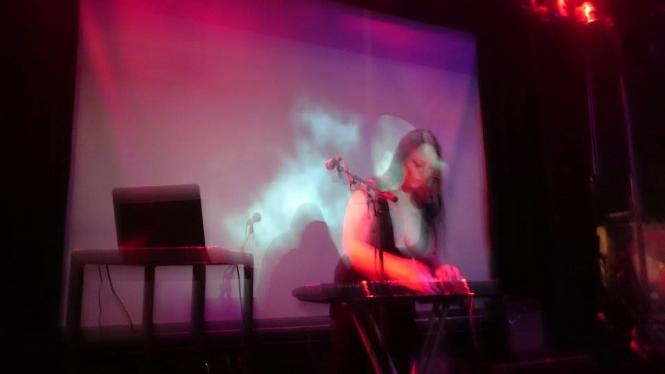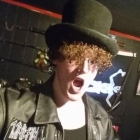
Corina Cinkl has managed to get her name out there thanks to her collaborations with such labels as Aufnahme + Wiedergabe. This Austrian songstress and producer has recently started a new solo project Black Heart, something she labels as being Dark Pop. Catching up with Corina and her new project, I talk about her album All Is Lost as well as history and influences. Be sure to stream her new album All Is Lost as a soundtrack for the discussion below!
Hi there Corina! Welcome to Brutal Resonance! Let's start off with simple stuff. Give us a little introduction to Black Heart, where you are from, and your favorite food.
Corina: My first instrument was my voice, followed by a short and unhappy love affair with the guitar, which led directly into a much happier romance with synths and drum machines that is ongoing to this day. I do not have a classically trained background, I am completely self-taught, and that meant learning from a diverse range of people along the way. So my inspiration came from many different sources. The first singers that inspired me were all female folk singers. I remember being drawn in by the intensity and the raw power of the vocal performances. The strength of the emotions and the unabashed way they manifested them through singing resonated deeply.
Corina: Artists like Björk, Tori Amos and Diamanda Galas have been influences throughout most of my life. Their music embodies qualities I strive for in my own artistic expression: honesty, intensity, relentlessness. As strong, powerful and loud, almost archetypal women they were also points of reference for me when I grew up and delved into the question of what it means to be female both on a personal and a socio-cultural level.
Corina: In the last three years I was in two different bands. With Ghost Actor we did kind of a vocal dark ambient style, had a few releases with Berlin-based-label aufnahme + wiedergabe before calling it quits for good last year. I had already started working with french-swiss industrial-folk collective Black Egg, where we also released a full length with aufnahme + wiedergabe and another via Spanish-french label Unknown Pleasures Records. I am not part of Black Egg anymore but I am sure they will continue as a collective with ever changing contributors for singing, writing, producing like I did for the last two albums.
Corina: I started writing music for the project more than two years ago. The moment the project was born was when I decided on the name Black Heart in mid-2015 and everything started to fall into place after that.

Corina: I released 'Alekto' earlier this year, a single track written and produced for a digital non-profit-compilation by Repartiseraren, a small Swedish webzine/label, and I have a few songs that were written for Black Heart that are not featured on All Is Lost. I might release them in the future, but the tracks on the record feel very complete to me as they are, and I cannot predict what the next record will look like in terms of its themes and general feel. So maybe these few songs will stay unreleased and only come to life when I perform them at shows.
Corina: Writing music generally comes easy to me. I feel blessed to have quite an open channel in terms of inspiration. With Black Heart that wasn’t different. Once I had started with the first song, which was a different version of the track 'Shadows', song after song came to me. I try not to intellectualize the writing process too much and just go with it and create a space that is free of judgement and ego. Of course, that is an ideal and most of the time I fail to achieve this, but I have found that as long as I strive towards it, it works well for me and allows the magick to happen.
Corina: I have always been very interested in mythology from all kinds of times and places, and for this album figures from Greek mythology inspired me deeply. The main themes of the album are loss and longing, and the pain and despair this brings. One of the myths that resonates with that on an almost primal level is that of Echo & Narcissus. With its psychological and spiritual depth, it is one of the most fascinating and most received stories of Greek mythology. Here we have two figures, archetypes that embody polarities of the self, in its blindness and its muteness. The failure to relate to another in a meaningful way is ultimately the failure to relate to oneself. It is the space of violence, of emptiness, of extinction. I wanted to explore the emotional experience of it through words and music.
Corina: I didn’t specifically set out to write music to fit the restrictions of any genre. The labeling came after the writing. It was more of a process of understanding it all backwards, kind of like sitting yourself down and asking, "Ok, what happened here musically?" Dark Pop is the label that I found fits best with what is going on within the music, the atmosphere it creates and it’s the darker color it gives to the timeless themes of the songs.
Corina: Inspiration for the lyrics came from intense examination of its main themes. Personal experiences always play a role when I write music or lyrics, but never in a direct way. Rather, they serve as a starting point for further exploration. Before I started writing for All Is Lost, I was in a place where I was asking questions about love and loss, about the self and the other and how we find ourselves in situations of extreme longing and pain and I went on a quest to find answers. Some of those answers found their way into the songs. I tend to look upon the end product, the lyrics as little treasures I bring back from those dives into the unknown. I might not understand them immediately in all their depths and shades, but they always have meaning and they always belong.

Corina: Creating art and putting it out there for others to consume is a deeply ambivalent experience for me always. On the one hand I absolutely revel in making music and connecting with others through that. It is the most blissful joy and I am head over heels in love with it. On the other hand, like many other artists I know, I experience extreme bouts of self-doubt about the worth of my work and the quality of my abilities. So when I finish a melody, a song, an album it is never a question of either finding it amazing or finding fault with it. It is more of a process of personal evolution, every time, like being on a rollercoaster of joy and pain, going full speed, relentlessly and continuously challenging me to go with the flow of it.
Corina: I just played my first full show in my hometown to celebrate the album release and I would love to play more shows across Europe in the months to come, starting this September.
Corina: Starting off with a video for the track 'Shadows' (coming end of June/beginning of July), I will be releasing more videos for the album in collaboration with Portuguese visual artist Pedro Inock. His artistic perspectives on the concepts of time and space go really well with mine and he is a multi-faceted, wondrously talented and truly interesting person and I am very happy to be working with him on parts of the visual angle of the Black Heart project.
Corina: Thank you for asking interesting questions! And for your interest in my music!
ORDER YOUR COPY OF ALL IS LOST HERE.
Jun 29 2016
Hi there Corina! Welcome to Brutal Resonance! Let's start off with simple stuff. Give us a little introduction to Black Heart, where you are from, and your favorite food.
Corina: Hey, thanks for having me! I am from Vienna, Austria and Black Heart is my new solo project, featuring music that can best be described as dark electronic pop.
Black Heart is classified as Dark Pop. But, I don't think Dark Pop is the first type of music you started playing. What was the first instrument you began playing? Who inspired you to play it?
If you could name five bands that have influenced either your musical style or personal life, who would they be?
Before Black Heart, were you a part of any other bands? If so, are those bands still alive today?
Black Heart's solo album is releasing this year in 2016. But when did Black Heart first start? When was it that you found the name?

Your debut album, All Is Lost, is the only music I can find on Black Heart. Do you have any earlier demos or other music saved somewhere else? If so, do you think you will ever find yourself releasing that music?
How has it been writing for Black Heart? Has it been easy? Has it been hard? Do you ever find yourself struggling to write music under Black Heart?
What was different and hard with this album was that I lost all of it when my computer and hard drives broke last December. I had to go and do it all again at a point where it was almost finished. The irony to lose an album called All Is Lost was definitely not lost on me. It took enormous strength to not give up and start over, and when I look back now I don’t know how I did it, really. It was an intense time, a whirlwind of emotion, a transformative chaos, and it was moving to feel how deep my connection was to all of the songs. In the process of reconstruction, a few of them underwent a kind of evolution and became refined versions of their previous selves. Writing this album not once, but twice, was an extremely humbling and empowering experience all at once.
Let's talk about All Is Lost. I read that the album takes inspiration from mythology. Which mythology do you take inspiration from? And how do you relate it to the darker side of the human experience?
You've labeled Black Heart's music as Dark Pop. How did you write out this material to conform to that genre? What did you do to make sure it wasn't just regular pop music?
The album seems like a very personal piece. What inspired you to write the lyrics for All Is Lost? Personal experiences?

Once All Is Lost was complete and finished, how did you feel about it? Did you find it amazing, or something that could be improved?
I am never satisfied with any of my work, I always find room for improvement after listening to it yet another time, but I have learned to at some point in the process put it out there regardless for others so see and hear. The questions I have found to be of value to decide how I feel about my art revolve around honesty and integrity more than anything else. Did I give this my all during the process of creating it? Did I create this from a place of inner truth and beauty? If the answers are positive, that is the closest I get to being satisfied with my work, and I have found this way of dealing with the creative process in all its ups and downs to be a very healthy stance. I don’t always manage that, but when I do it allows me to feel good about my art and enables me to take pride in what I do in a raw and authentic way and I love that.
Do you have any plans to perform live for Black Heart? If so, when do you think you will get to it?
Is there anything else I may have missed that you would like to mention?
Lastly, I would like to thank you for your time and wish you the best of luck with your career. Cheers!
ORDER YOUR COPY OF ALL IS LOST HERE.

Steven Gullotta
info@brutalresonance.comI've been writing for Brutal Resonance since November of 2012 and now serve as the editor-in-chief. I love the dark electronic underground and usually have too much to listen to at once but I love it. I am also an editor at Aggressive Deprivation, a digital/physical magazine since March of 2016. I support the scene as much as I can from my humble laptop.
Share this interview
Facebook
Twitter
Google+
Shares
Popular interviews
Psyclon Nine
Interview, Mar 24 2017
Night Runner
Interview, Oct 13 2016
Testube
Interview, Apr 02 2022
Kite
Interview, Feb 10 2017
God Destruction
Interview, May 17 2016
Related articles
Black Heart - 'All Is Lost'
Review, Sep 22 2016
Ships In The Night - 'Myriologues'
Review, May 25 2017
Aberrant Behavior - 'Disorder'
Review, Jul 13 2017
Summore - 'New Pain'
Review, Sep 10 2023
Licorice Chamber
Interview, Apr 18 2022



